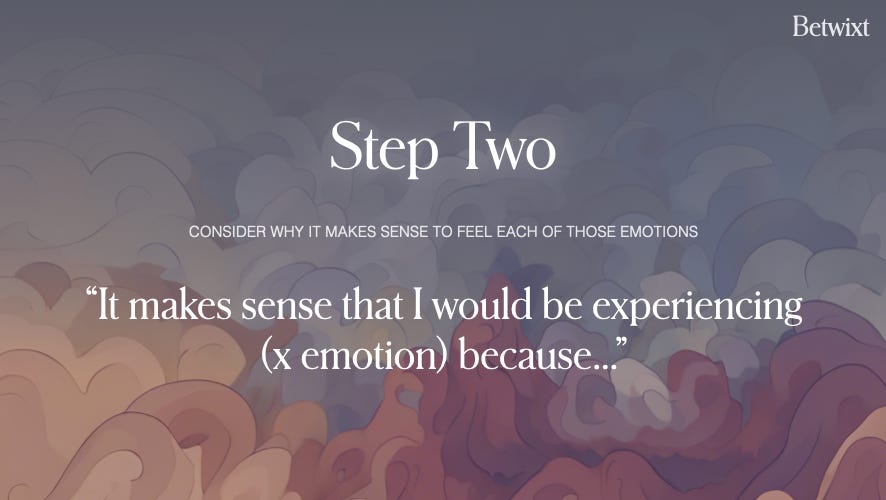Six signs you could be a dialectical thinker
And how to master this powerful mental tool in 3 simple steps
You can listen to this post on TikTok, YouTube or Instagram.
***
This is how to tell if you're a dialectical thinker, and why you should work on it if you're not.
In studies, dialectical thinking has been found to promote coping flexibility, decreased anxiety and depression, fewer psychosomatic and stress-related symptoms, and higher quality of life over time.
So, do you think you have this important skill? Let's find out.
Responding true or false (going with true if it's mainly true and false if it's mainly false – we're just getting a general idea here), make a note of your reactions to each of these sentences:
Are you a dialectical thinker? Answer true or false:
I am the same around my family as I am around my friends.
If I have made up my mind about something, I stick to it.
I have a definite set of beliefs, which guide my behavior at all times
I have a strong sense of who I am, and don’t change my views when others disagree with me
My outward behaviors reflect my true thoughts and feelings
I usually behave according to my principles
So… Do you have more trues or more falses?
These statements are from the Dialectical Self Scale, but I have something to admit: they're the reverse options. That means if you answered "true" more often than "false" just now, then you may currently struggle with or lack the skill of dialectical thinking.
I don't know about you, but that blew my mind the first time I came across it. Look at the list again:
Does this not read like an instruction manual for how to be the person we should strive to be? We are conditioned to value things like principled behaviour, mental fortitude, transparency, consistency and confidence in our beliefs. But these very things could be damaging our mental and even physical health.
What even is dialectical thinking?
So, how should we be viewing ourselves and the world if these kinds of statements are unhealthy? In other words, what is dialectical thinking?
In a nutshell, you’re a dialectical thinker if you believe that everything is always changing; that contradictions can co-exist in harmony; and that meaning is found in the bigger picture.
You may have heard of DBT – or Dialectical Behaviour Therapy – which is an evolved form of Cognitive Behavioural Therapy (CBT) that was specially adapted for people who feel emotions very intensely. The aim of DBT is to help people strike a balance between validation and the need to change – that is, acceptance of who we are and the life we have at the same time as knowing it could all be better.
Put really simply, it's about being accepting as well as adaptable when it comes to our thoughts, feelings, behaviour and self.
A fundamental principle of dialectical thinking is that everything is composed of opposites. This means that in order to understand things more fully, we need to also accept, consider and understand their opposites.
A dialectic is when two opposing thoughts, feelings or ideas are true at the same time. For example, it is possible to both love and deeply resent your partner simultaneously, just as it's possible to be both frightened and excited about an upcoming change, or to both want to quit and continue with a problematic habit.
The common reaction to these inevitable conflicts is to judge one perspective as good and the other as bad. For example, "I love my partner so it's bad that I feel resentful of them right now,” or, "I want to be healthy and to give up smoking/drinking, and therefore my cravings are bad, and that little part of me that just wants to take the easy path and carry on needs to be rejected, destroyed or ignored, because it's wrong."
Sound familiar? We resist the "bad" reality, trying to push it away in the hope that it'll disappear. Which never works, because what we resist persists – rejected thoughts, feelings and behaviour grow bigger and scream louder when we try to shut them out. This can lead to stress, anxiety, self-doubt, self-loathing, and all sorts of other awful things.
DBT therapists help their clients to live from a perspective where all those seemingly opposing thoughts and feelings are allowed to co-exist. This, in turn, reduces the desire to judge, minimise or negate emotional experiences, and leads to a more peaceful, integrated existence.
How to practise dialectical thinking
So, how can we all start to do this? Well, first, let me read you the remainder of the Dialectical Self Scale, because the statements I read earlier were only the reverse options (that is, the ones that, theoretically, a dialectical thinker would rate as false).
Here are the statements a dialectical thinker would rate as true:
I often change the way I am, depending on who I am with.
I often find that things will contradict each other.
My world is full of contradictions that cannot be resolved.
I am constantly changing, and am different from one time to the next.
The way I behave usually has more to do with immediate circumstances than with my personal preferences.
When I hear two sides of an argument, I often agree with both.
I sometimes believe two things that contradict each other.
I often find that my beliefs and attitudes will change in different contexts.
I would imagine that some of those statements do already feel fairly true, and if you want to build this skill further, then here's a very simple three-step process you can use.
Step 1: Reflect on an emotional situation and identify conflicting emotions
Call to mind a challenge or area of friction in your present life – nothing too huge, of course, it's best to start small. And, for the sake of this exercise, if you can't think of anything suitable from your current life, you can use something from the past: a difficult relationship or job, the challenge of giving something up for learning a new skill, etc.
When you have it, take a moment to observe that situation as if from a distance. Push it away just a little, so you don't get wrapped up in its story. Then ask yourself this:
“What are all the different feelings I’m having right now?”
Note down everything that comes to mind, paying attention to the subtle nuances of your emotions, as well as their intensity and frequency. Do you feel fear, anger, hope, love? Which of these emotions feels strongest or most persistent? Get it all down.
Step 2: Consider why it makes sense to feel each of those emotions
Taking the feelings on your list one at a time, adopt a really curious stance and just ask yourself why it may make sense to feel that way, especially when it comes to emotions you might be judging as wrong or bad.
I would recommend you write these things down. Start by writing "It makes sense that I would be experiencing (x emotion) because…"
Step 3: Consider what each emotion is trying to tell you
Finally, when you've done that, step 3 is to consider what each emotion is trying to tell you. Get curious about the messages sent by these feelings.
Just as physical pain encourages us to care for a physical injury or ailment, negative emotions exist to draw our attention to a psychological wound or imbalance. By listening to all our emotions, not just those we deem acceptable or good, we often learn important – if a little challenging – information about things we need to change, and ways to look after ourselves.
Remember that no emotion can ever be deemed good or bad, no matter how it's felt or in reaction to what. It's only once an emotion turns into an action – a behaviour or other expression of that feeling – that we can judge it as positive or negative, helpful or unhelpful, productive or unproductive.
The whole point of this approach is to create the possibility of consciously choosing the actions we take. By building and allowing awareness of all our emotions, we also build the ability to control and choose the ways in which we respond and interact with them.
***
References
Cheng C. "Dialectical thinking and coping flexibility: a multimethod approach". J Pers. 2009 Apr.
Spencer-Rodgers, J., & Peng, K. (in prep). What is dialectical thinking? Conceptualization and measurement. Chapter to appear in J. Spencer-Rodgers & K. Peng (Eds.). The psychological and cultural foundations of East Asian cognition. Oxford University Press
Spencer-Rodgers, J., Srivastava, S., Boucher, H. C., English, T., Paletz, S. B., & Peng, K. (2015). The dialectical self scale. Unpublished manuscript, California Polytechnic State University, San Luis Obispo.
Thank you for reading!
We’re Hazel (ex boxer, therapist and author) and Ellie (ex psychology science writer). We left our jobs to build an interactive narrative app for self-awareness and emotion regulation (Betwixt), which you can try on Android here and on iOS here.










